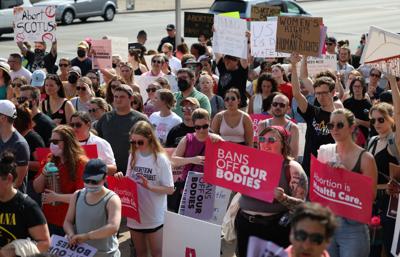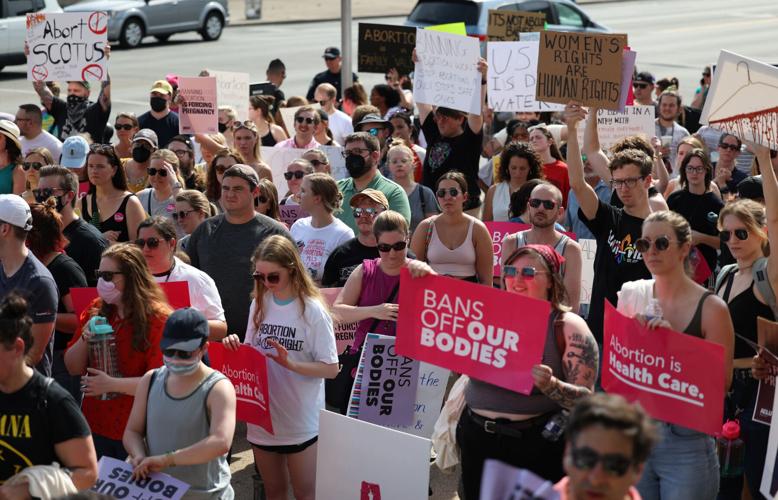LOUISVILLE, Ky. (WDRB) -- The Kentucky Supreme Court denied a request to take an emergency review of a lower court's ruling reinstating a near-total abortion ban in the state, meaning most abortions in the state will remain illegal.
However, the high court will hear arguments and eventually rule on whether abortion should be banned in Kentucky.
Initial briefs are due by Sept. 19, with oral arguments scheduled for Nov. 15 in Frankfort.
Until then, an August ruling by the state Court of Appeals reinstating two laws banning almost all abortions in the state will stand.
The high court found the "circumstances presented (in the appeal by the ACLU) ... do not rise to the level of extraordinary cause" needed to rule immediately, according to the 12-page-ruling.
The ban took effect when the U.S. Supreme Court overturned Roe v. Wade. The ruling means most abortions are illegal in the state, for now.
ACLU attorneys for the EMW Women's Surgical Clinic and Planned Parenthood in Louisville filed an appeal to the state Supreme Court.
Angela cooper, communications director for the ACLU, said the high court "punted" to wait until after the Nov. 8 general election when voters will decide on a ballot measure whether the state constitution contains no right to abortion.
A statement about the ruling was released from leaders of Planned Parenthood Federation of America, the American Civil Liberties Union, and the ACLU of Kentucky on behalf of EMW Women’s Surgical Center and Planned Parenthood Great Northwest, Hawai‘i, Alaska, Indiana, Kentucky:
“The Supreme Court’s decision to allow Kentucky’s abortion bans to remain in effect puts nearly a million people’s health care in jeopardy. Abortion is not only health care but also a critical individual freedom. Make no mistake: abortion bans result in tragic health outcomes and are a form of control over our bodies. Despite this setback, the fight continues. We will proceed with our case to restore and protect reproductive freedom in Kentucky. Politicians and the government should never have the authority to force a person to remain pregnant against their will.”
In a tweet, Attorney General Daniel Cameron praised the ruling.
"We are pleased with this victory for life and the rule of law and will continue to prepare for the arguments the Court has scheduled."
Two of the seven justices, including Chief Justice John Minton Jr., disagreed with the majority that the case did not rise to the level of emergency relief.
"The issues raised in Movants' motion for emergency relief are of such significant statewide importance as to satisfy the standard for extraordinary cause," Minton wrote in a dissent. Deputy Chief Justice Lisabeth Hughes agreed. Both Minton and Hughes are retiring after this year.
"This Court cannot turn a blind eye to the fact that this case involves one of the most contentious policy and political issues of our time," Minton wrote in his dissent. "It is difficult to comprehend a more important or serious legal issue than legal access to abortion in the Commonwealth. Put differently, if review of access to abortion under these circumstances does not provide extraordinary cause warranting emergency interlocutory review by this court, what issue would constitute extraordinary cause?"
Minton and Justice Michelle Keller also criticized the ruling by the court of appeals.
"The Court of Appeals not only failed to give appropriate deference to the trial court but also failed to undertake a thorough analysis that is required in a case of this magnitude, failing even to set forth the appropriate standard of review," Keller wrote. "That being said, remanding this matter to the Court of Appeals to engage in a proper analysis would only further delay the final resolution of these compelling issues. Recognizing that matters of life, death, and health are at stake, time is of the essence."
Minton concluded he would have upheld the state court ruling to put the abortion bans on hold.
"We would also grant Movants’ motion for emergency interlocutory relief because the Court of Appeals abused its discretion by failing to give appropriate deference to the circuit court’s factual and equitable conclusions. The temporary injunction entered by the Jefferson Circuit Court should remain in place pending final resolution of this litigation or an intervening change in law."
Attorney General Daniel Cameron had asked the appeals court for an emergency stay, which blocked a lower court's ruling. That ruling by Jefferson County Circuit Court Judge Mitch Perry put two abortion bans on hold so the courts could determine if they violate Kentucky's constitution.
In their motion to the Kentucky Supreme Court, the clinics said that ruling had "upended 50 years of the status quo" by essentially halting abortion access in Kentucky. As a result, women previously scheduled to receive abortions are now being turned away, the filing said.
"The challenged bans have eliminated access to abortion in Kentucky and they are imposing irreparable harm on plaintiffs and their patients in a variety of ways, including by forcing Kentuckians to remain pregnant, and eventually give birth, against their will," the motion said.
The state's two clinics have said "abortion is now banned in Kentucky."
Kentucky's trigger law was meant to ban abortions as soon as the U.S. Supreme Court overturned Roe v. Wade in late June. The Kentucky law contains a narrow exception allowing a physician to perform an abortion if necessary to prevent the death or permanent injury of the pregnant woman.
Kentucky lawmakers also passed a separate six-week ban that the clinics are challenging.
The lower court judge, Mitch Perry, ruled on July 22 that there is "a substantial likelihood" that Kentucky's new abortion laws violate "the rights to privacy and self-determination" protected by Kentucky's constitution.
This story may be updated.
Copyright 2022 WDRB Media. All Rights Reserved.














